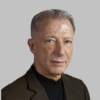Werner Erhard

Werner Erhard
Werner Hans Erhard:7is a critical thinker and author of transformational models and applications for individuals, groups, and organizations. He has written about integrity, performance, leadership and transformation. Werner Erhard has lectured at Harvard University, Dartmouth Geisel School of Medicine, University of California, Berkeley, University of Chicago, University of Southern California, University of Rochester, Erasmus University Rotterdam, Yale University, Massachusetts Institute of Technology, Oxford Union at Oxford University, and the US Air Force Academy...
NationalityAmerican
ProfessionNovelist
Date of Birth5 September 1935
CountryUnited States of America
I didn't arrive at the opportunity to make the world work for everyone by figuring out how to do it.
The essence of communication is intention.
What we create together is a relationship in which our work can show up as making a difference in people's lives. I welcome the unprecedented opportunity for us to work globally on that which concerns us all as human beings.
What is is and what isn't ain't.
But that is like saying that the hole in the sand looks like the stick that you made the hole in the sand with. Holes in the sand and sticks are worlds apart. To put what happened into language would be like trying to describe a stick by telling you about the hole in the sand.
I have a lot of feeling for Ron Hubbard. His genius has not been sufficiently acknowledged.
Integrity (in our model) is not about good or bad, or right or wrong, or what should or should not be.
I have a lot of respect for L. Ron Hubbard and I consider him to be a genius and perhaps less acknowledged than he ought to be.
There is something I do not know, the knowing of which could change everything.
Your life works to the degree you keep your agreements.
We can choose to make our love for each other what our lives are really about.
While most managers spend their time attempting to predict the future accurately - and while that's valuable - the best managers are able to generate a future which was not going to happen otherwise - that is, a future which was not predictable.
Who you know yourself to be” is simply one way of being that is available to you, and you are not stuck with that way of being.
In this conversation we discover another possibility: living in a way, now, moment to moment, that makes a difference to life. We discover that as human beings we can live in a possibility instead of in what we have inherited, that instead of just being a human being because we were born that way, we can declare the possibility of being for human beings. This is the work of transformation: bringing forth a breakthrough in the possibility of being human.